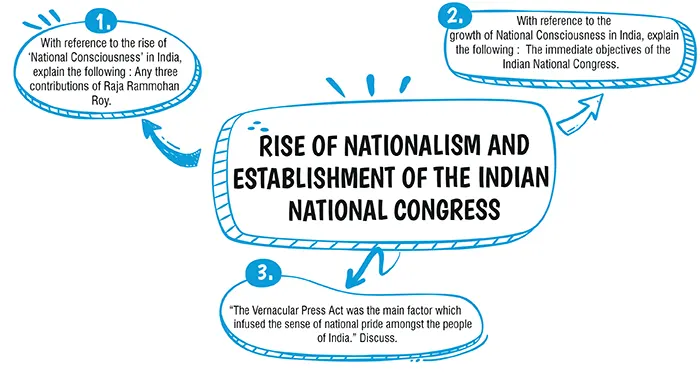Home / Board / ICSE / important Questions / Class 10 / History & Civics / Rise of nationalism and establishment of the indian national congress
Table of Contents

Ans. (c) To train and mobilise public opinion all over the country
Explanation:
W.C.Banerjee's declared aim for the Indian National Congress was to promote and consolidate the feeling of national unity and to formulate and present popular demands to the government.
Ans. (a) IV, I, III, II
Explanation:
The printing press has been instrumental in disseminating ideas to the masses. It facilitated the publication of numerous nationalist journals aimed at stirring the Indian public's sentiments against oppressive British rule. These newspapers actively promoted notions of nationalism, patriotism, justice, liberty, and equality in the country.
Explanation:
Three contributions of Raja Rammohan Roy: 1. In 1828, he founded the Brahmo Sabha, which was later renamed, Brahmo Samaj. The Brahmo Samaj believed in Monotheism or worship of one God. It condemned idol worship and laid emphasis on prayer, meditation, charity, morality and strengthening the bonds of unity between men of all religions and creeds. 2. He was against the rigidity of the caste system. He started a campaign for the abolition of the Sati and Purdah system, condemned polygamy, discouraged child marriages and advocated the right of widows to remarry. 3. It was because of the efforts made by Raja Rammohan Roy that William Bentinck, the Governor General of India, passed a law in 1821 making the practice of Sati illegal and punishable by law. He also protested against restrictions on the freedom of press.
Explanation:
The immediate objectives of the Indian National Congress : In the Presidential address of the first session of the Indian National Congress held at Bombay in December, 1885, W.C. Bonnerjee declared the following as the objectives of the Indian National Congress :
1. To promote friendly relations between nationalist political workers from different parts of the country.
2. To develop and consolidate the feelings of national unity irrespective of caste, religion or province.
3. To formulate popular demands and present them before the government.
4. To train and organise public opinion in the country. The Congress held its sessions every year in December to chalk out programmes to achieve its aims. Changes were made in the above mentioned aims of the Congress from time to time according to the changed circumstances.
Explanation:
The Vernacular Press Act : The Vernacular Press was the main source which could spread the message of patriotism among the people. It also created economic, social and political awareness among the people. During the second half of the nineteenth century, a number of newspapers, journals, magazines were published in different Indian languages which criticised the British administration, for its indifference towards the welfare of the Indians. Sixty two newspapers were on the scene by 1877, and they enjoyed a wide circulation. Soon the Vernacular Press Act of Lord Lytton in 1878 laid down that the newspaper editors were to sign a bond that they would publish nothing which would create feelings of dissatisfaction against the Government. This was a repressive measure of the British, therefore a wave of bitterness against the British spread. In spite of all restrictions, the Indian Press continued to criticise the British Government. As a result, the Vernacular Press Act was withdrawn by Lord Ripon in 1882, but the Act already had its adverse effect on the Indian people who were filled with the spirit of Nationalism. Many Indian writers wrote books on patriotism. Bankim Chandra’s famous book ‘Anandmath’ inspired the IndiAns. The book in Bengali and translated into Marathi, Tamil, Hindi and Urdu, provided great inspiration to the people in uniting Indians.
Download Mind Map of this chapter
Download NowWant to Practice Mock Tests of this chapter
Practice NowDownload Important Questions of this chapter
Download NowCBSE Important Questions Class 10
ICSE Important Questions Class 10
CBSE Important Questions Class 10
ICSE Important Questions Class 10